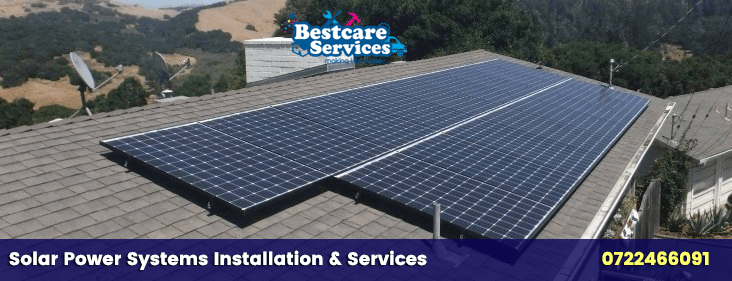Table of Content
Solar Power Battery Backup Systems Installation in Nairobi, Kiambu, Machakos, Mombasa, Nakuru, and Kenya
The demand for Solar Power Battery Backup Systems in Nairobi and Kenya is on the rise due to frequent power outages and the growing need for reliable and sustainable energy. These systems ensure uninterrupted power supply by storing excess energy generated by solar panels for use during blackouts or periods of low sunlight. This article provides detailed insights into installation costs, spare parts prices, and the benefits of installing Solar Power Battery Backup Systems in Nairobi and Kenya.
What Are Solar Power Battery Backup Systems?
Solar Power Battery Backup Systems store energy from solar panels, providing backup power when the main grid fails or during the night. They are vital for homes, businesses, and institutions that rely on constant electricity supply.
Benefits:
- Ensures uninterrupted power supply.
- Reduces reliance on the national grid.
- Environmentally friendly and sustainable.
Quote: "Investing in solar battery backups ensures you're always prepared for unexpected power outages, saving both time and productivity."
Installation Costs of Solar Power Battery Backup Systems in Nairobi and Kenya
The cost of installation depends on the size and capacity of the system. Below is a general breakdown of installation costs:
| System Capacity | Usage | Installation Cost (Ksh) |
|---|---|---|
| 1 kWh | Small home appliances | 50,000 – 70,000 Ksh |
| 3 kWh | Medium households | 150,000 – 200,000 Ksh |
| 5 kWh | Large households | 250,000 – 350,000 Ksh |
| 10 kWh | Commercial use | 500,000 – 700,000 Ksh |
| Above 10 kWh | Industrial purposes | 1,000,000+ Ksh |
Cost of Spare Parts for Solar Power Battery Backup Systems in Nairobi and Kenya
Replacing or upgrading components of your system is sometimes necessary. Here is a price guide for commonly required spare parts:
| Spare Part | Cost (Ksh) |
|---|---|
| Solar Batteries (12V, 100Ah) | 15,000 – 25,000 Ksh |
| Inverters (1 kVA – 5 kVA) | 10,000 – 60,000 Ksh |
| Charge Controllers | 5,000 – 15,000 Ksh |
| Solar Cables (per meter) | 200 – 500 Ksh |
| Battery Racks | 5,000 – 15,000 Ksh |
Quote: "Quality spare parts not only ensure system longevity but also improve overall efficiency."
Factors Affecting the Cost of Solar Power Battery Backup Systems in Nairobi and Kenya
- System Size: Larger systems with higher capacities cost more but offer greater reliability.
- Type of Batteries: Lithium-ion batteries are more expensive but last longer than lead-acid batteries.
- Brand and Quality: Premium brands provide better warranties and performance, though they come at a higher cost.
- Installation Location: Urban areas like Nairobi and Mombasa may have slightly higher installation charges compared to rural locations.
Why Choose Solar Power Battery Backup Systems in Nairobi and Kenya?
- Reliable Power Supply: Keeps your home or business operational during power outages.
- Cost Savings: Reduces electricity bills by utilizing stored solar energy.
- Environmental Impact: Lowers your carbon footprint by using renewable energy.
- Scalability: Systems can be upgraded as your energy needs grow.
Quote: "Solar battery backups are an investment in energy independence and a step towards a greener future."
How to Save on Solar Power Battery Backup Installation Costs
- Choose the Right Capacity: Avoid oversizing or undersizing the system by evaluating your power needs.
- Bundle Purchases: Many providers offer discounts when purchasing complete systems (panels, batteries, and inverters).
- Government Incentives: Look for rebates or tax benefits for installing renewable energy systems in Kenya.
- Regular Maintenance: Proper upkeep minimizes costly repairs or replacements.
Investing in Solar Power Battery Backup Systems in Nairobi and Kenya is a smart choice for ensuring reliable energy and reducing electricity costs. With various options available for both residential and commercial needs, you can select a system that fits your budget and requirements. Remember, while the initial cost may seem high, the long-term savings and environmental benefits make it worthwhile.
Final Tip: "Partner with experienced installers to ensure optimal performance and a seamless transition to solar power.

